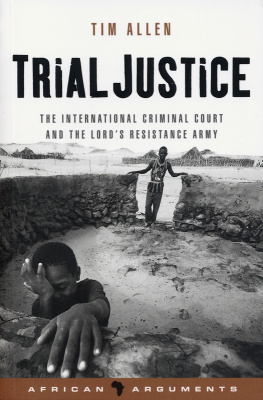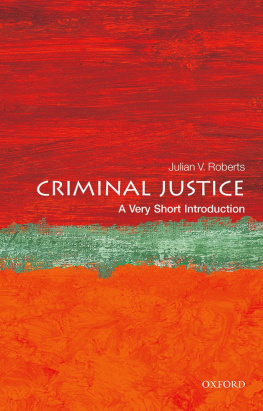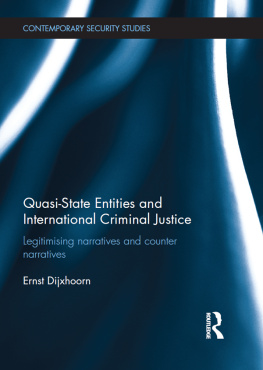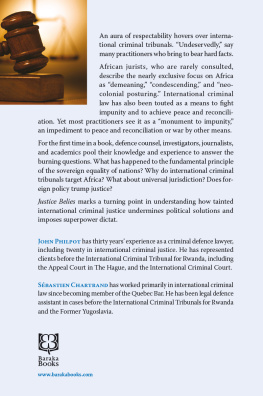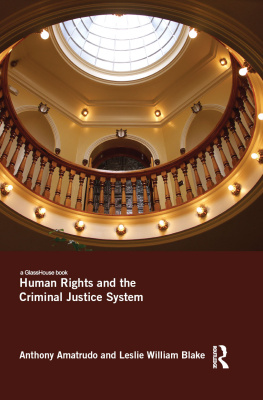Transforming International Criminal Justice
Transforming International Criminal Justice
Retributive and restorative justice in the trial process
Mark Findlay and Ralph Henham
First published by Willan Publishing 2005
This edition published by Routledge 2011
2 Park Square, Milton Park, Abingdon, Oxon OX14 4RN
711 Third Avenue, New York, NY 10017 (8th Floor)
2005 Mark Findlay and Ralph Henham
All rights reserved; no part of this publication may be reproduced, stored in a retrieval system, or transmitted in any form or by any means, electronic, mechanical, photocopying, recording or otherwise without the prior written permission of the Publishers or a licence permitting copying in the UK issued by the Copyright Licensing Agency Ltd, 90 Tottenham Court Road, London W1P 9HE.
First published 2005
ISBN 978-1-84392-078-6
British Library Cataloguing-in-Publication Data
A catalogue record for this book is available from the British Library
Project management by Deer Park Productions, Tavistock Typeset by GCS, Leighton Buzzard, Beds
Contents
R v. Cunningham [1993] 1 WLR 183
R v. Fountain [2002] EWCA Crim 2335
R v. Hodgson (1967) 52 Cr App R (S) 948
R v. Lundberg (1995) 16 Cr App R (S) 948
R v. M [1999] 1 WLR 485
R v. Offen [2000] CLR 492; (2001) 2 All ER 154
R v. Turner [1970] 2 QB 321; [1970] 2 WLR 1093
Codice di procedurea penale. Decreto del Presidente della Repubblica, 22 settembre 1988, n. 447 in supplemento ordinario n. 1. alla Gazzetta Ufficiale, serie generale, n. 250, 24 ottobre, 1988
Codice Penale. Gazzetta Ufficiale (supplemento) n. 253 del 28 ottobre 1930
Crime (Sentences) Act 1997
Costituzione della Repubblica Italiana, in Gazzetta Ufficiale, n. 289 del 27 Dicembre 1947
Criminal Justice Act 1991 (c 53)
Criminal Justice Act 2003 (c 44)
Criminal Justice and Public Order Act 1994 (c. 33)
Powers of Criminal Courts (Sentencing) Act 2000 (c 6)
This book sets out an agenda to transform international criminal trials and thereby the delivery of international criminal justice (ICJ)1 to victim communities. The progress of the book itself charts a transformation of thinking about the comparative analysis of trial process. The product has a potential to advance the boundaries of ICJ through wider access and inclusivity in an environment of rights protection.
It commences with an investigation of social theory supporting a model of the trial as a process of decision-making. In order to interrogate and apply this model to international criminal trials, the comparative analysis of examples from the trial traditions most influential over international trial process is attempted. Detailed analysis of trial transcripts from Italy and England is the empirical focus for such analysis, and the challenges inherent in this methodology are explored.
The comparative analysis applied suggests the importance of understanding both the fact and value of trial decision-making. The trial as process presents opportunities to examine the synthesis and difference behind procedural influences over ICJ. The decision model identifies and applies the uniform importance of discretion in decision-making, the centrality of lay and professional relationships in trial decision processes, and the significance of truth in forming the substance of the principal decisions in the process.
At this point an important pathway of influence in the process is analysed the relationship between the judge and the victim in the sentencing process. This case study identifies the relevance of normative frameworks as a context for understanding how the decision process is materialized in practice. But more than about rules and procedures, such an understanding rests on discovering how discretion moves important decision relationships and how these in turn are constructed and operated through a feature of influence. Addressing the particular problems facing the judge/victim relationship when translated into contexts of international criminal trials demands a radical rethinking of trial process and the engagement with other important ICJ paradigms. Transformation in this setting will rely on enhancing the moral legitimacy of ICJ through wider access, greater inclusion and a more protected victim voice in the process and outcomes of ICJ.
The radical dimension of the book is in its argument for the harmonization of restorative and retributive justice within ICJ. The manifesto for how trial transformation is to be achieved gives the authors confidence that the new international criminal trial will invigorate ICJ as a force for global governance.
Foundations
The genesis of this book is the pressing need to provide theoretical and empirical insights into the relatively recent phenomenon of ICJ and its manifestation in the principles and practices of international criminal trials. In addition to the creation of international structures to investigate and try crimes of global significance, there is emerging an international jurisprudence on criminal law (and procedural hybrids to support and develop this) which requires integrated analysis. Such developments are formal and informal in nature and context, reflecting predominantly retributive and restorative aspirations for penality and reconciliation respectively.
The present pace and form of change in ICJ appears largely as the product of global political imperatives (Christie 1977: 115; Scharf 1999). The nature of these imperatives has necessitated the operation of formal trials and their resultant penal sanctions within the two broad and divergent Western criminal justice traditions (Anglo-American common law and Western European civil law) exemplified in the adversarial and inquisitorial trial forms. Outside this, the jurisdictions of the developing world in particular are adapting restorative and truth-focused justice paradigms to manage crimes of international significance.
The internationalization of criminal trial institutions especially has, therefore, prompted debates about synthesizing formal styles of criminal procedure (Findlay 2001a). However, this is by no means a straightforward matter involving a conventional bifurcated consideration of separate criminal justice procedural traditions. It requires comparative research within the realms of politics, policy and politicization at the local and global level. It demands an interrogation of alternative justice approaches in contest for ICJ constituencies and outcomes. With formal justice process, action and human relationships (Henham and Findlay 2001c) for decision-making require analysis as drivers of justice, rather than remaining content with a dry and narrow discussion of competing constitutional legalities. For the less formal ICJ paradigms, the expectations of states in transition and their victim communities are important contexts for analysis. The book confronts and attempts to harmonize these alternative justice directions.
In broad terms, our analysis is motivated by the twin desires. First to provide a basis for understanding what the internationalization of criminal justice signifies as a fusion of ideology and structure, and second a concern that the institutions of ICJ should forge morally legitimate connections between the allocation of individual responsibility for international crimes and the principles for distributive justice which post-conflict societies and transitional cultures demand. We consider that some accommodation between the relativity of global and local justice is necessary for the fulfilment of these aspirations. As we argue and demonstrate progressively throughout what follows, comparative contextual analysis (CCA)2 provides a methodology for predicting how legitimate expectations for justice can be translated into practice. It also shows us that for a truly ICJ, mechanisms of truth and accountability must grow from the consciousness of victim communities.


